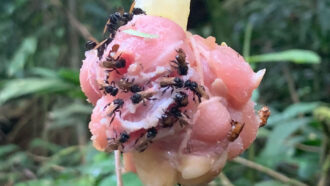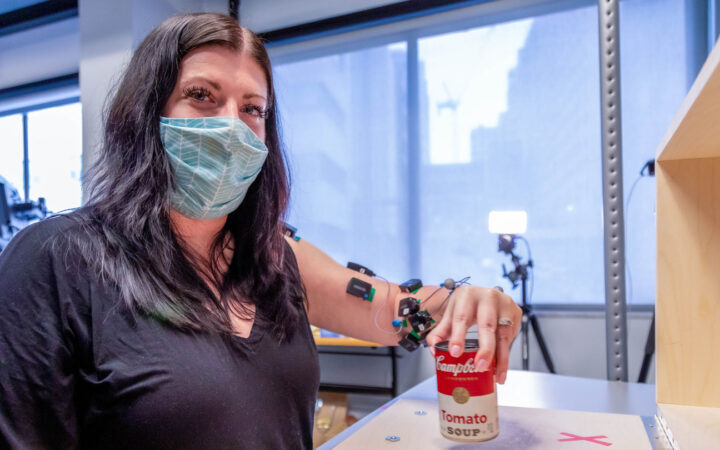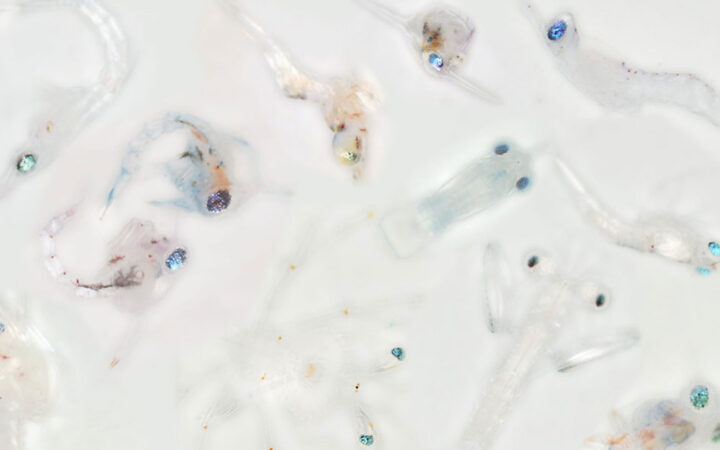
Mention foraging bees and most people will picture insects flitting from flower to flower in search of nectar. But in the jungles of Central and South America, “vulture bees” have developed a taste for decaying flesh.
They are “the weirdos of the bee world,” says insect biologist Jessica Maccaro of the University of California, Riverside. Most bees are vegetarian.
Scientists have puzzled over why the stingless buzzers seem to prefer rotting carcasses to nectar (SN: 2/11/04). Now, Maccaro and colleagues think they have cracked the riddle by looking into the bees’ guts.
Vulture bees (Trigona spp.) have a lot more acid-producing gut bacteria than their vegetarian counterparts do, Maccaro and colleagues report November 23 in mBio. And those bacteria are the same types that protect carrion feeders such as vultures and hyenas from getting sick on rotting meat.
To probe the bees’ insides, Maccaro’s colleagues trekked into a Costa Rican jungle. Since vulture bees feed on almost any dead animal, including lizards and snakes, the researchers cut up store-bought chicken and suspended the raw flesh from tree branches. To deter ants, the team smeared petroleum jelly on the string that the meat dangled from.
“The funny thing is we’re all vegetarians,” says entomologist Quinn McFrederick, also of UC Riverside. “It was kind of gross for us to cut up the chicken.” That gross factor quickly intensified in the warm, humid jungle: The meat rotted, turning slimy and stinky.
Bees took the bait within a day. As the scavengers stopped by to dine, the researchers trapped about 30 bees. The team also captured another 30 or so of two other types of local bees — one that feeds on only flowers and one type that dines on both flowers and rotting meat. All bees were stored in alcohol-filled vials to preserve the insects’ DNA for analysis, as well as the DNA of any gut microbes.
Strictly meat-eating bees had between 30 percent and 35 percent more acid-producing gut bacteria than strictly vegetarian bees and the ones that sometimes eat meat, the team found. Some types of these microbes showed up only in the solely carnivorous bees.
Similar acid-producing bacteria in the guts of vultures and hyenas keep toxin-producing microbes in rotting meat from making the animals sick. The microbes probably do the same for the meat-eating bees, the team says.
The health benefit extends beyond individual bees, says David Roubik, an evolutionary ecologist at the Smithsonian Tropical Research Institute in Balboa, Panama, who was not involved in the work. Vulture bees regurgitate some of the meat they consume, storing it in their nests where it serves as food for young bees. Some of the acid-loving gut bacteria end up in this food reserve, Roubik says. “Otherwise, destructive bacteria would ruin the food and release enough toxins to kill the colony.”
In the end, Maccaro says, it’s hard to know which evolved first — the gut bacteria or the bees’ ability to eat meat. But the bees probably first turned to meat because there was so much competition for nectar for food, she suspects.

 A new treatment could restore some mobility in people paralyzed by strokes
A new treatment could restore some mobility in people paralyzed by strokes  What has Perseverance found in two years on Mars?
What has Perseverance found in two years on Mars?  This robot automatically tucks its limbs to squeeze through spaces
This robot automatically tucks its limbs to squeeze through spaces  Greta Thunberg’s new book urges the world to take climate action now
Greta Thunberg’s new book urges the world to take climate action now  Glassy eyes may help young crustaceans hide from predators in plain sight
Glassy eyes may help young crustaceans hide from predators in plain sight  A chemical imbalance doesn’t explain depression. So what does?
A chemical imbalance doesn’t explain depression. So what does?